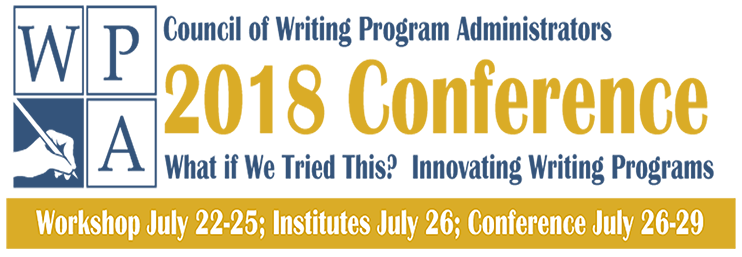Design Thinking as WPA Tool: Innovating Curricula, Teaching Practices, and Program Outreach
WPA Institute, Thursday, July 26: 8:00 a.m. – 5:00 p.m.
Design Thinking, or “human-centered design,” has moved beyond its original focus on engineering product designs to consider new applications, including in education. As we gather in Sacramento, this workshop will allow participants to learn innovation techniques that can serve them in their roles as WPAs.
As a process, design thinking is based in methods that help designers—including program designers like WPAs—to learn more deeply about the needs of those we serve (our students, our faculty, our institutions), to articulate those needs in ways that consider the desirability of actions as well as their feasibility, and to generate fresh new ideas that can help to break the sometimes insidious cycle of doing things a certain way because—as we’ve all heard—that’s simply “what we’ve always done.”
This workshop will help you to learn skills to break that cycle and move toward innovation through a human-centered approach.
The workshop will begin with a hands-on introduction to design thinking, followed by several activities throughout the morning that explore a variety of contexts in which design thinking can inform WPA work:
- (Re)designing the research component of writing courses;
- Fostering an experimental mindset in writing faculty and their pedagogies;
- Reimagining general education assessment practices;
- Developing faculty development exercises; and
- Telling persuasive stories about our programs to campus stakeholders.
In the afternoon we will then turn to specific projects that participants are considering at their home institutions. Through both group work and consultations with the facilitators, participants will create a human-centered design for accomplishing that work or develop their own design thinking workshops for campus stakeholders.
Facilitators
 |
Dr. Dominic DelliCarpini is the Naylor Endowed Professor of Writing Studies and Dean for the Center for Community Engagement at York College of Pennsylvania, where he also served as WPA for 13 years. He currently serves as President of the Council of Writing Program Administrators. As Director of York College’s Graham Innovation Scholars program, he teaches Design Thinking regularly, and has participated in related programming and workshops with the University Innovation Fellows at Stanford University’s Hasso Plattner Institute of Design (the “d.school”). He has also conducted design thinking workshops for faculty and administrators. |
 |
Dr. Scott Wible is an Associate Professor of English and Director of the Professional Writing Program at the University of Maryland. He serves as a Distinguished Faculty Fellow at and has co-taught several courses with UMD’s Academy for Innovation and Entrepreneurship; participated in the Teaching and Learning Studio at Stanford’s d.school; and has delivered several invited lectures on design thinking-oriented writing classes, most recently at the University of Louisville’s 2016 Thomas R. Watson Conference. His research exploring the intersections of language diversity and public policy has appeared in College Composition and Communication, College English, Rhetoric Society Quarterly, and Cultural Studies, and his book Shaping Language Policy in the U.S.: The Role of Composition Studies (Southern Illinois University Press, 2013) won the 2014 CCCC Advancement of Knowledge Award. |
